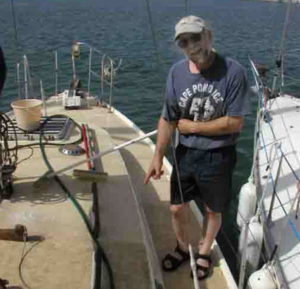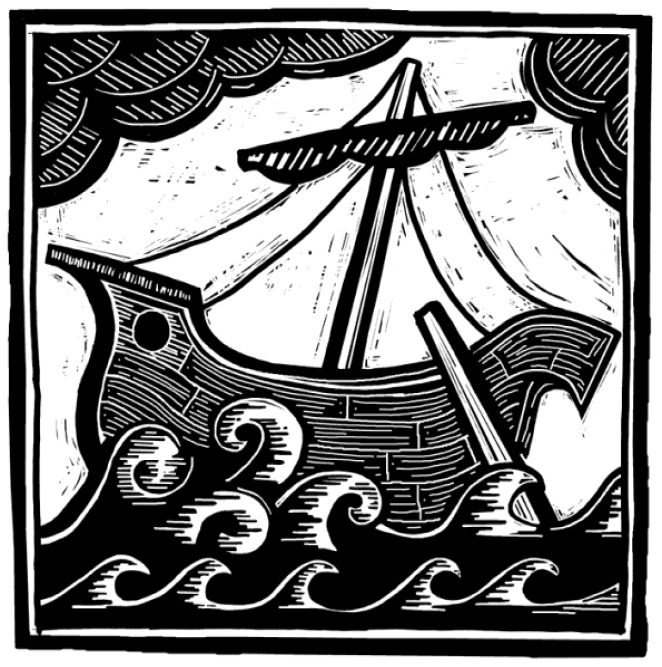
Another week in Volos, Greece, on the boat that someday soon will be christened “SailingActs.” Mike Hostetler, worn out and limping after four intense days of desperately sanding, scrubbing, sweating, fixing, cleaning, in order to get the boat in the kind of shape that Janet’s first impression would be positive, left on Monday, May 17. We got up before daybreak in order to drive to Athens, 300 km. distant, in time to get some of the endless paperwork done before the government offices close around noon. We found the US embassy, then the official translation office, finished the last round of Greek bureaucracy, and headed to Piraeus for Mike to catch a ferry for a little R and R on the Greek island of Hydra before heading back to Nazareth, Israel, and for me to find some supplies for the boat. I pick up what I need, then drive out through the Olympic construction zones to the airport to deliver the rental car and meet Janet.
Janet arrives! It is wonderful to see her, safe, smiling, excited. We collect the two large bags labeled “heavy,” (full of books and equipment) stagger to the shuttle bus stop in pouring rain. We disembark downtown Athens and walk the two blocks to the bus station in the pouring rain and 5 inch deep puddles. We catch the bus to Volos at 8:00 pm. and head north in the dark and pouring rain, arriving in Volos at 12:30 (in the pouring rain) grab a taxi which drops us off on the wharf. We slog our way toward the Aldebaran, my heart pounding. Will Janet say, “Oh what a beautiful boat!” or, “Do you expect me to live on this thing for the next 15 months?”
We walk up the slippery gangplank, open the hatch, water running everywhere, descend the 3 steps into the cabin. “Oh, what a beautiful boat!” Janet says, “I love it!” YES! I look around again. All I have been seeing for 2 weeks is the garbage, the broken water pump, the oily film over everything, the neglected teak. Now I see a boat with charm, character, full of possibility. The boat has been undergoing a conversion and I hadn’t even noticed.

Which brings us to Paul and ourselves. Humans are a little like boats, full of potential but needing a lot of work to bring out the goodness, especially if they have been neglected.
David, our son currently working in Germany with the German Mennonite Peace Committee, arrived on Wednesday. More hands to work, more people around the table, more discussion of world events, life, the future, the similarity between the Roman world of Paul, and our own.
I was thinking about this the other day when I took down the tattered Greek flag that had been flying from the Aldebaran. Now that the boat is officially deregistered in Greece, it is no longer a Greek boat, so the flag must come down. At present, the boat has no flag at all because it is not yet documented as a United States boat. Having no flag is fine with me, but the only drawback is that the boat cannot leave the wharf until it has a flag. All of the other boats along the wharf have Greek flags.
I asked Panos, the man working on the boat next to ours, whether we had to fly the flag all the time. “You are supposed to,” he said, “but I have heard of only one incident where someone was fined for not flying the national flag.” He knew without me telling him, why I am somewhat reluctant to fly the American flag.
Here is why. I discussed this with Captain Steve, the former owner of the boat, the other day. “You are documenting the boat in the United States?” he asked.
“Yes.”
“That means that you will be flying the American flag.”
“Yes.”
“That is like flying a red flag in a bull ring,” said Captain Steve.
And I am afraid he is right. We live in a world and in a time where America is the most powerful, feared, admired, hated, attractive, and scrutinized nation on earth. A boat flying the American flag in a way publicly represents America, among the flags of the Mediterranean nations. I want to slip in and out of harbors without being feared, admired, hated, attractive and scrutinized, but this will not be possible flying the American flag. Because America is acting in the world these days, a lot like Rome acted in the Mediterranean during the First Century.
It is clearer now, the reluctance Paul had of being identified as a Roman citizen. It had its advantages, but he did not want to fly the Roman flag either.
